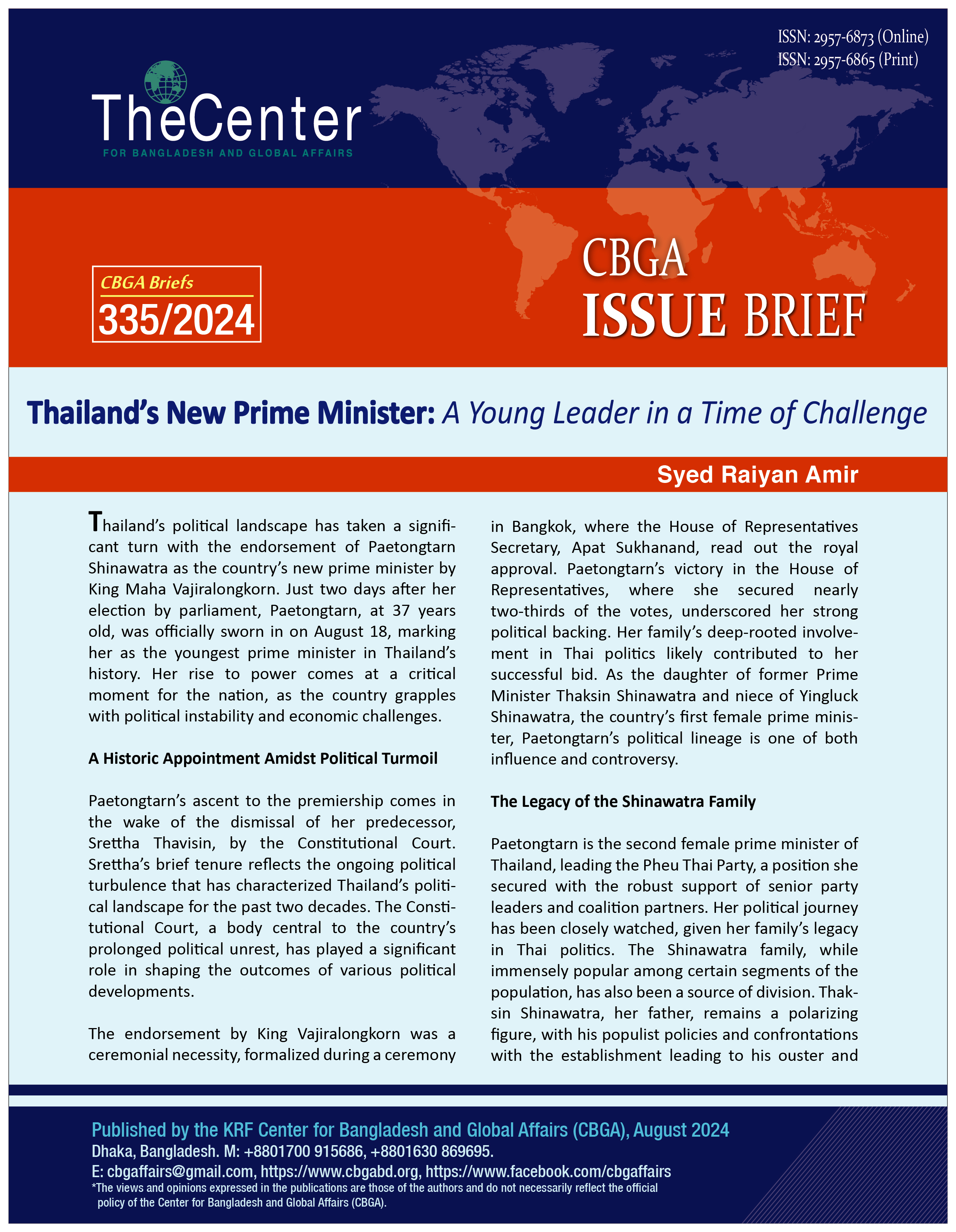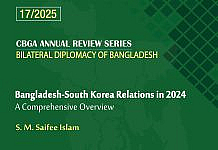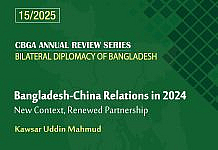
Thailand’s political landscape has taken a significant turn with the endorsement of Paetongtarn Shinawatra as the country’s new prime minister by King Maha Vajiralongkorn. Just two days after her election by parliament, Paetongtarn, at 37 years old, was officially sworn in on August 18, marking her as the youngest prime minister in Thailand’s history. Her rise to power comes at a critical moment for the nation, as the country grapples with political instability and economic challenges.
A Historic Appointment Amidst Political Turmoil
Paetongtarn’s ascent to the premiership comes in the wake of the dismissal of her predecessor, Srettha Thavisin, by the Constitutional Court. Srettha’s brief tenure reflects the ongoing political turbulence that has characterized Thailand’s political landscape for the past two decades. The Constitutional Court, a body central to the country’s prolonged political unrest, has played a significant role in shaping the outcomes of various political developments.
The endorsement by King Vajiralongkorn was a ceremonial necessity, formalized during a ceremony in Bangkok, where the House of Representatives Secretary, Apat Sukhanand, read out the royal approval. Paetongtarn’s victory in the House of Representatives, where she secured nearly two-thirds of the votes, underscored her strong political backing. Her family’s deep-rooted involvement in Thai politics likely contributed to her successful bid. As the daughter of former Prime Minister Thaksin Shinawatra and niece of Yingluck Shinawatra, the country’s first female prime minister, Paetongtarn’s political lineage is one of both influence and controversy.
The Legacy of the Shinawatra Family
Paetongtarn is the second female prime minister of Thailand, leading the Pheu Thai Party, a position she secured with the robust support of senior party leaders and coalition partners. Her political journey has been closely watched, given her family’s legacy in Thai politics. The Shinawatra family, while immensely popular among certain segments of the population, has also been a source of division. Thaksin Shinawatra, her father, remains a polarizing figure, with his populist policies and confrontations with the establishment leading to his ouster and subsequent exile. Yingluck Shinawatra, her aunt, faced a similar fate, being removed from office and later fleeing the country.
Despite these challenges, the Pheu Thai Party has remained a formidable force in Thai politics, with its populist agenda resonating with many voters. However, the party has also faced significant setbacks, including its first election defeat in more than two decades last year. Paetongtarn’s appointment is seen as a continuation of the Shinawatra political legacy, with the party seeking to regain its dominance in the country’s political sphere.
Challenges Ahead: Economy and Governance
As the new prime minister, Paetongtarn faces a daunting array of challenges. Thailand’s economy is in a precarious state, with stagnation and public discontent creating a challenging environment for governance. The country’s economic woes have been exacerbated by a decade of military and semi-military rule, which has stifled growth and led to increasing public debt. Addressing these economic issues will be crucial for Paetongtarn’s administration, as the economy remains a primary concern for Thai voters.
In her first news conference as prime minister, Paetongtarn outlined her commitment to continuing the policies of her predecessor, Srettha Thavisin. This includes significant economic stimulus and reform measures aimed at revitalizing the economy. Among the key initiatives is the promise of a digital wallet scheme, intended to provide financial relief to voters by offering approximately $300 to every citizen. However, the delay in rolling out this scheme has led to criticism and skepticism regarding the party’s ability to deliver on its promises.
Paetongtarn also emphasized her focus on tackling illegal drugs, improving the country’s universal healthcare system, and promoting gender diversity. These priorities reflect the broader agenda of the Pheu Thai Party, which has traditionally advocated for populist policies aimed at addressing the needs of the general population.
Balancing Continuity and Change
One of the key challenges for Paetongtarn will be maintaining a balance between continuity and change. While she has pledged to continue many of Srettha’s policies, there is also a need for her administration to assert its own identity and address the unique challenges facing the country. This includes managing the expectations of both her supporters and the broader public, who are eager for tangible improvements in their daily lives.
The presence of Srettha at Paetongtarn’s swearing-in ceremony was a symbolic gesture of continuity, signaling the party’s intention to maintain stability and avoid abrupt changes in governance. However, Paetongtarn will need to facilitate the complex dynamics of Thai politics, where alliances can shift rapidly, and where the military and royalist factions continue to wield significant influence.
The Role of the Constitutional Court and the Military
Thailand’s political landscape is heavily influenced by its judiciary and military, both of which have played pivotal roles in the country’s history of coups and government dissolutions. The Constitutional Court’s decision to dismiss Srettha underscores the precarious nature of political power in Thailand, where legal and institutional mechanisms can be used to disrupt the democratic process.
Paetongtarn’s administration will need to tread carefully to avoid conflicts with these powerful institutions. The dissolution of the anti-establishment Move Forward Party, last year’s election winner, serves as a stark reminder of the challenges facing any government that seeks to challenge the status quo. The party’s campaign to amend the royal insult law was met with swift judicial action, reflecting the sensitivity of issues related to the monarchy.
Paetongtarn has indicated that her government will not seek to challenge the royal defamation law, a move that is likely aimed at avoiding confrontation with the military and royalist factions. This pragmatic approach suggests that her administration will focus on economic and social issues rather than pursuing controversial political reforms.
The Divided Political Landscape
Thailand’s political landscape remains deeply divided, with the Pheu Thai Party facing strong opposition from the newly formed People’s Party, which emerged from the remnants of the dissolved Move Forward Party. This division reflects the broader polarization within Thai society, where differing views on democracy, the role of the monarchy, and the influence of the military continue to create tensions.
Paetongtarn’s ability to run through this divided landscape will be crucial to her success as prime minister. She will need to build alliances and foster dialogue among the various political factions to ensure that her government can implement its policies effectively. This will require a chiffony balancing act, as she seeks to maintain the support of her own party while also addressing the concerns of the opposition and the broader public.
Looking Forward: Paetongtarn’s Vision for Thailand
As Thailand’s youngest prime minister, Paetongtarn Shinawatra brings a fresh perspective to the country’s leadership. Her vision for Thailand is one of economic revitalization, social progress, and political stability. Achieving this vision will require overcoming significant obstacles, including economic challenges, political divisions, and the entrenched power of the military and judiciary.
Paetongtarn has shown a willingness to learn from the past while also charting a new course for the future. Her commitment to listening to all opinions and working with legislators to move the country forward with stability reflects a pragmatic approach to governance. By focusing on the economy and addressing the needs of the population, she has the potential to build a broad base of support and bring about meaningful change in Thailand.
However, the road ahead will not be easy. The challenges facing Thailand are deeply rooted, and Paetongtarn will need to demonstrate strong leadership and resilience in the face of adversity. Her success as prime minister will depend on her ability to navigate the complex political landscape, address the economic concerns of the population, and maintain stability in a country that has experienced decades of political turmoil.
Paetongtarn Shinawatra’s appointment as Thailand’s prime minister marks a significant moment in the country’s history. As the youngest leader to hold this office, she faces the daunting task of guiding Thailand through a period of economic uncertainty and political division. With her family’s legacy behind her and the support of the Pheu Thai Party, Paetongtarn has the potential to make a lasting impact on the country’s future.
Her pragmatic approach, focusing on economic reform and social progress, offers a pathway toward stability and growth. However, the challenges she faces are formidable, and her success will depend on her ability to build consensus, manage competing interests, and deliver on her promises to the Thai people. As she embarks on this new chapter in Thailand’s political history, all eyes will be on Paetongtarn Shinawatra and her vision for the future of the country.
– Syed Raiyan Amir is a Senior Research Associate at the KRF Center for Bangladesh and Global Affairs (CBGA).







